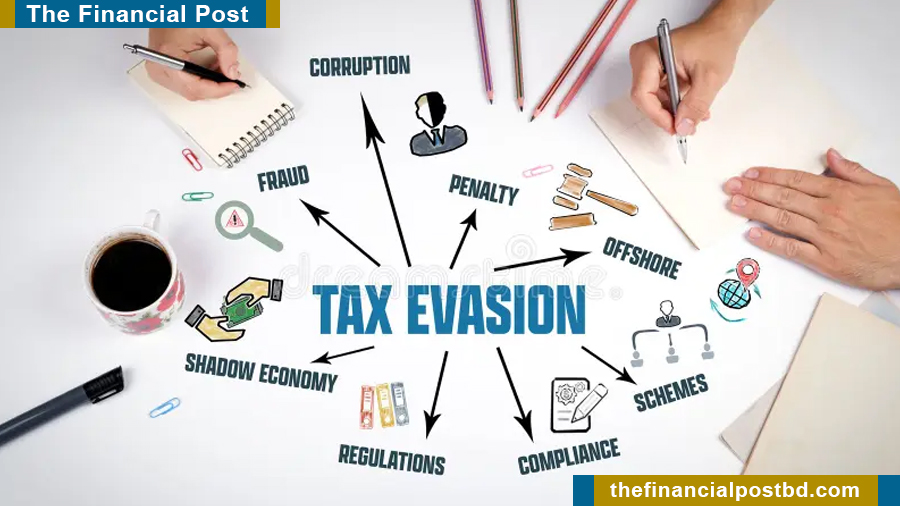Tax evasion among affluent individuals poses a significant challenge to fiscal stability and socio-economic equity in Bangladesh. Despite steady improvements in tax collection over the past decade, the tax-to-GDP ratio remains among the lowest in South Asia, hovering around 8 to 9%.
This suggests systemic inefficiencies and widespread non-compliance, particularly by wealthy individuals and business elites. However, this phenomenon is not unique to Bangladesh; it is a global issue, though the scale and institutional responses vary.
To understand the tax evasion landscape, we need to understand the root causes first.
Globally, affluent individuals generally evade tax using offshore accounts, shell companies and trusts, manipulated transfer pricing and political capture, and regulatory arbitrage. Apart from these, tax evasion by the affluent in Bangladesh is driven by several overlapping factors. One of the key factors is weak enforcement mechanisms.
What does Dhaka lack to monitor tax evasion?
The National Board of Revenue (NBR) lacks both the workforce and the digital tools to audit high-net-worth individuals (HNWIs) effectively. Alongside, manual, and discretionary tax assessment aggravate the situation. Besides, there exists opaque wealth structures.
The use of nominee accounts, underreported assets, and shell companies enables tax avoidance and evasion. Additionally, political patronage and corruption is an open secret. Powerful individuals often enjoy informal protection from scrutiny, especially when aligned with political elites.
Moreover, widespread perceptions of government inefficiency and corruption reduce voluntary compliance. Furthermore, a lack of interagency coordination, such as between NBR and ACC, has a detrimental effect.
Success in other countries
The US Foreign Account Tax Compliance Act (FATCA) requires foreign financial institutions to report assets held by US citizens.
This global net has successfully exposed hidden offshore wealth. Complemented by the Internal Revenue Service’s use of advanced data analytics to identify red flags in filings, it highlights the power of integrated digital systems in reducing evasion.
Institutionalizing data-sharing agreements and building AI-powered audit algorithms can help the NBR target non-compliant wealthy individuals more effectively.
India's 2016 Income Disclosure Scheme allowed evaders to declare unaccounted income with reduced penalties. Simultaneously, India enacted the Benami Transactions Prohibition Act, which targets assets held under a false name.
Solutions
Time-bound disclosure schemes with post-disclosure monitoring, combined with aggressive enforcement of beneficial ownership laws, can expose hidden assets while creating deterrence. We can also learn from Pakistan, which has introduced whistleblower rewards with measurable success in unearthing evasion.
To effectively address tax evasion, the government must strengthen the institutional framework. The authority can use telecom usage, foreign travel, real estate, and vehicle registration data to triangulate undeclared income. Countries like Estonia and Brazil use such integrated platforms for risk-based auditing.
Besides, it is crucial to introduce performance incentives and transparency benchmarks for NBR officials, reducing corruption and inefficiency. We can think of amending laws to allow pre-emptive freezing of suspicious assets during tax investigations, as practiced in Switzerland and Canada. There is no alternative to leveraging technology for compliance.
Along with digital profiling, we can think of piloting blockchain in property records or customs declarations to minimize opportunities for underreporting and manipulation. Integrating NBR and customs data to detect under-invoicing in imports, a tactic widely used by wealthy business owners, can also be instrumental.
Policies to address tax evasion
Additionally, crafting policies to address tax evasion among the affluent can yield substantial results. Imposing targeted taxes on high-value assets such as luxury vehicles and second homes can both raise revenue and identify potential evaders.
Bangladesh needs to introduce voluntary disclosure schemes. Well-designed, time-bound amnesties tied to strict future compliance checks can bring hidden wealth into the formal tax net. In addition, public scrutiny and societal pressure can play a decisive role. We also need to encourage whistleblower protections. Providing incentives for credible tips about evasion can uncover complex networks.
Moreover, Bangladesh must engage in global efforts to trace and reclaim illicit financial flows. We should emphasize on strengthening bilateral agreements to access offshore banking data and real estate holdings in tax havens. We need a mechanism in place so that the multinational enterprises based in Bangladesh cannot shift profits abroad through artificial invoicing or intellectual property loopholes. Furthermore, an independent tax ombudsman needs to be in place to oversee tax disputes and protect whistleblowers.
Combating tax evasion by the affluent in Bangladesh is not a matter of policy preference but of national necessity. Tax evasion by the affluent is not simply a technical or legal issue; it reflects power imbalances and institutional weaknesses.
To effectively combat it, Bangladesh must adopt a layered approach: Smart enforcement using technology, targeted legal reform, behavioural nudges, and international cooperation. Global case studies offer concrete templates, but success hinges on political will, transparency, and sustained institutional investment.
In a country with a burgeoning middle class and increasing demands for public services, ensuring the affluent contribute fairly is not only fiscally essential but also morally imperative.
Dr Mohammad kamrul Hasan is a public administration and public policy analyst.
FP


 Khagrachhari blockade fully withdrawn
Khagrachhari blockade fully withdrawn
 Hamas agrees to parts of Trump’s Gaza plan, seeks more talks, bombing eases
Hamas agrees to parts of Trump’s Gaza plan, seeks more talks, bombing eases
 Remittances Keep Bangladesh’s Economy Afloat After July Uprising
Remittances Keep Bangladesh’s Economy Afloat After July Uprising
 BNP to give ‘green signal’ soon to single candidates for constituencies: Salahuddin
BNP to give ‘green signal’ soon to single candidates for constituencies: Salahuddin
 Light to moderate rain, thundershowers likely
Light to moderate rain, thundershowers likely